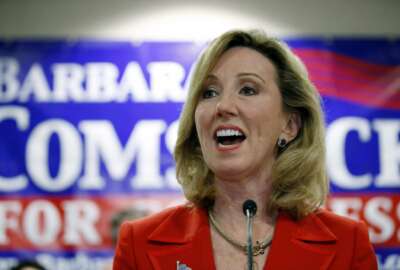
House Democrats revive efforts to give federal employees paid family leave
House Democrats have again reintroduced legislation that would guarantee paid family leave for federal employees to care for a new child or sick family member. This...
Maybe the third, fourth or fifth time is the charm.
House lawmakers on Tuesday again revived their attempts to pass a paid family leave bill for federal employees. This time, Rep. Carolyn Maloney (D-N.Y.), along with House Majority Speaker Steny Hoyer (D-Md.) and Reps. Jennifer Wexton and Don Beyer (D-Va.), have introduced the Federal Employee Paid Leave Act.
The legislation would guarantee up to 12 weeks of paid leave for federal employees to witness the birth, adoption or fostering of a new child and care for a new child or family member with a serious medical condition. The leave would also apply to federal employees who have a serious medical condition themselves and need time to recover.
The United States and Papua New Guinea are the only countries in the world that don’t have paid maternity leave programs written into law.
“Usually the federal government leads, but on this one, we’re far, far behind,” Maloney said.
Federal employees have a right to unpaid parental leave through the Family and Medical Leave Act, but there’s no governmentwide policy that guarantees paid leave for new mothers and fathers. And though federal workers can accumulate and carry over sick leave from year to year, it doesn’t leave young families with many options if their sick bank is completely empty after the birth of a new child.
The Federal Employee Paid Leave Act would replace the patchwork of options that government employees currently have to take sick, maternity or paternity leave. It applies to most federal employees, men and women.
Wexton and Beyer described the benefits that a paid family leave program would bring to federal agencies who have actively struggled to recruit and retain young employees. Just 6 percent of the federal workforce is under the age of 30, while just more than 18 percent of federal employees who were on board at the start of fiscal 2018 were eligible to retirement, according to the Partnership for Public Service.
Support from administration, unions
Maloney’s bill, which has 12 co-sponsors, certainly has a better chance at passage in the House this year than previous attempts. House Oversight and Reform Committee Chairman Elijah Cummings (D-Md.) is also a co-sponsor and has expressed interest in bringing the bill to the committee for a hearing.
“So many good things take a long time,” Hoyer said Tuesday. “I’m hopeful that this will be the session that Congress adopts this bill.”
Maloney said she’s had federal employees call her office and ask about the status of the bill. Though the bill doesn’t yet have a Republican co-sponsor yet, she said similar legislation has earned bipartisan support in the past.
The American Federation of Government Employees, National Treasury Employees Union and National Active and Retired Federal Employees (NARFE) Association have all endorsed the 2019 bill.
Related Stories
“I can speak to you about what it’s like to raise four children and have to try and use up whatever leave you have, to point where you have no leave,” he said. “That’s exactly what was going on during my career. Fortunately, I’ve had some excellent supervisors who were able to say, ‘Ken, come in on the weekend.’ Was that a solution? At least I was able to get through that particular period of time.”
Former President Barack Obama signed an executive memo in 2015, which authorized federal employees to use six weeks of advanced sick leave to care for a newborn child. Both Obama and President Donald Trump included a paid parental leave program in previous budget requests at one point during their administrations, but those recommendations fell short.
Trump again mentioned his interest in supporting a paid leave program in his most recent State of the Union address last month. Maloney and other members said they hoped they could build off that interest in appealing to the White House to build serious support for the legislation.
Maloney said she planned to write to Ivanka Trump, the President’s daughter who has called for a national paid family leave program in the past, to ask for a meeting.
House members, meanwhile, have been trying for years to pass similar legislation.
The fight for paid parental leave for federal employees has been a long one for Hoyer, who co-authored a similar version of the bill back in 2009. It passed the House eight years ago, and even then, the legislation had been pending in some form or another for several previous years.
Maloney herself has introduced similar legislation in 2017, which then called for six weeks of paid family leave for federal employees.
Former Rep. Barbara Comstock (R-Va.), with Maloney, introduced similar legislation last year. The 2018 bill would have given federal employees up to 12 weeks of paid leave after the birth, adoption or fostering of a new child.
Copyright © 2025 Federal News Network. All rights reserved. This website is not intended for users located within the European Economic Area.
Nicole Ogrysko is a reporter for Federal News Network focusing on the federal workforce and federal pay and benefits.
Follow @nogryskoWFED




